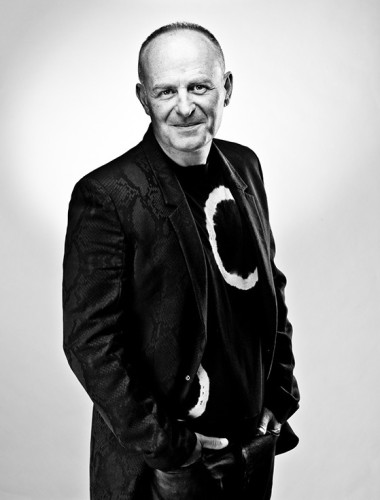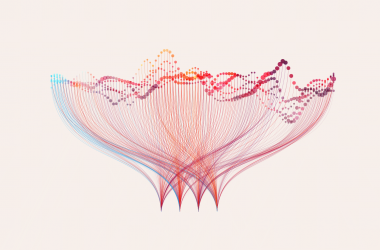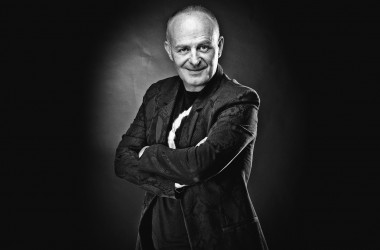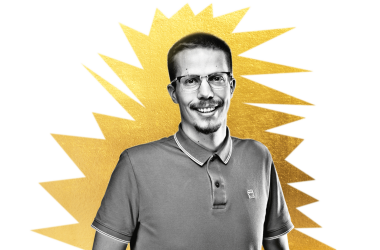The present is in the hands of those who understand needs. The future is for those who can listen to wishes.
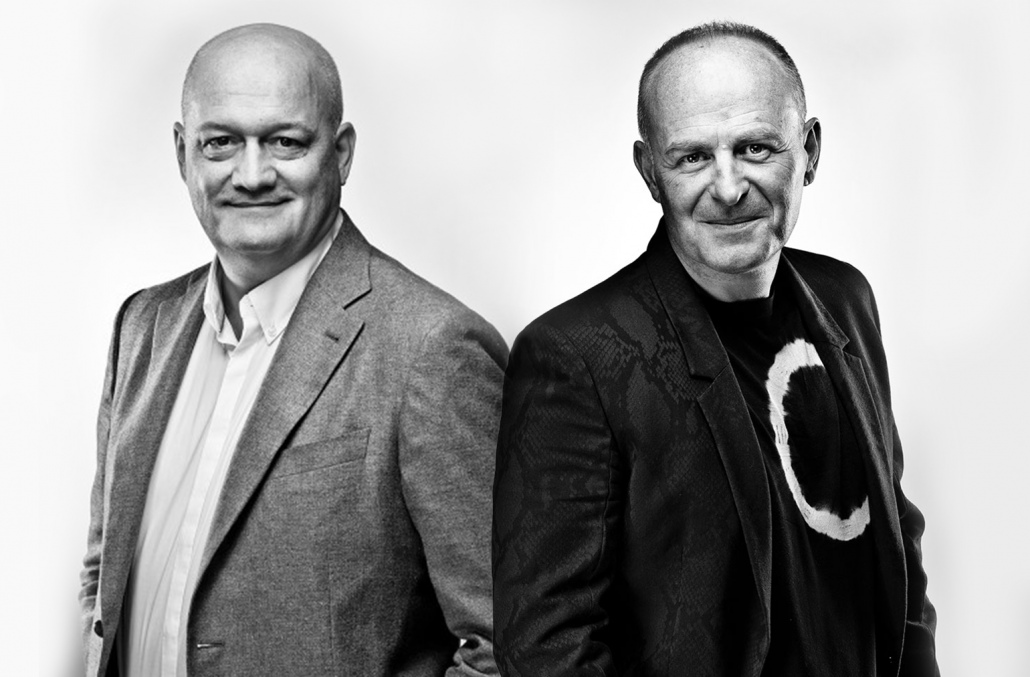
In 1986, along with two other partners, they founded Futura. It is their mission to convey messages with freshness and humour that addresses our intelligence, and to maintain an extremely high level of ethics in the team relationships. Vital Verlič and Marko Vičič have no room for past credits, pride, or status, but enjoy witty dialogue, clashes of opinions, open mental flow and creative impulses. As creative directors they have received numerous domestic and foreign advertising awards: Futura was named Slovenian agency of the year nine times, won the Golden Drum three times, and the numerous Effie awards are proof that Futura’s creativity is not an end in itself, but can be used to efficiently solve the challenges of our customers in the time of modern technologies.
What was the start of your success story, which brought the Futura of today to be one of the largest and most esteemed marketing agencies in Slovenia?
Marko: It started with what we would today call a start-up. The beginnings of our agency lie in our time at University, where we were colleagues studying architecture. Because we were interested in design and communication, we started working on it in our final year of studies in a small studio. Creativity was and still is an extremely important part of our operation. But understanding the brand is even more important. That is our DNA.
Vital: With our work, we are constantly challenging the future. Our business is to transform corporate plans into successful marketing strategies. But the responsibility remains the same: to influence society and enrich the balance sheets of our clients.
What were the key steps in your career?
Marko: At the end of the 80s we presented ourselves as a design studio, and there were only three of us. Then we seriously entered the advertising business, and later into advertising as a whole, using media buying, thus becoming a holistic advertising agency. And important milestone was joining DDB, which is one of the biggest agencies worldwide. They approached us as the main agency for McDonald’s looking for a new partner in our region for brand expansion purposes. We got along, connected, and the commitment holds to this day. The next milestone was definitely the establishment of digital communications. For this purpose, we bought Profana and integrate it into Innovatif, but realised two years ago that we were not comfortable with the level of diversification, so we returned to our roots and brought everything back together. Now we are more of a “full-service” agency than ever before, all in one entity, because we believe that it currently crucial to be more complex. That is how we can work easier and more efficiently.
Your motto is: in an interconnected world, only the brands that place the customers at the centre of their activities can be influential.
Vital: That’s right! It doesn’t only matter what kind of product you're selling – the user experience you create with the product is much more important. Digitalisation is swiftly changing the relationships between providers and users. Successful brands place the customers and their user experience at the centre of their business strategies. A successful business model can currently be powered only by a prompt recognition of needs. Individualisation, tailored to the user’s needs, is the next phase in the digital transformation of business models.
I also noticed your term “orchestrated marketing” which is especially intriguing in the context of the Manager’s Concert.
Vital: Orchestrated marketing is based on integration and orchestration of all touchpoints (between the users and the brand), their content, and dynamic analytics. It all needs to function as a coordinated orchestra. Because we have integrated all the agency's services, which we now offer to our clients, we can maintain focus on the user and the orchestration of marketing as a whole, not just individual agency services.
Marko: The most important person in an orchestra is the conductor. Regardless of the talent of individual virtuosos, the conductor is the one joining them into a whole, into a quality performance. Which is why we find cooperation with the Manager’s Concert interesting, we’ve been a part of it for 25 years – from the very beginning! This association with an orchestra is close to us in the sense of what we do commercially as well as in the sense of an excellent service as a result of our work. Furthermore, life is not just business, but is filled also with art.
It would seem that a marketing agency and an orchestra have some things in common?
Vital: A lot of things. When we listen to a symphony, we can value it by its technical performance or simply let our emotions take over. Marketing is similar: for a perfect marketing symphony you need virtuosos who can handle their instrument and with that their part of the business. You need an excellent musical score, that is the creation and the plan your music follows. And you need a maestro – the conductor to orchestrate it all. The objective in music as in marketing is the same: to stimulate and arouse emotions to move something within yourself.
The creative charge is very important in any marketing campaign. And yet you stress that creativity cannot be an end in itself.
Marko: What we do is after all not art. It is an activity classified in creative industry and is closely related to artistry, but it is not art. After all, our work expresses a client’s order, and does not stem from our own impulses – that is the key difference between us and artists. According to Bernbach, creativity is the most powerful weapon a businessman can imagine. Of course, it must be managed well and appropriately placed.
Vital: Like any tool, marketing can also become a weapon. It depends on how we use it. It used to hold that the person who has power, has influence. Now it holds that the person who has influence, has power. We all know that power without influence is a paper tiger, an aristocratic ornament of past times. On the other hand, influence is the force that can shake many a fortress of strength overnight. Just look at what happened to Apple, Google, Tesla, Uber.
Anyone who knows you knows that you get nervous as soon as something becomes routine, and that your great audacity is to sniff out the kernels of opportunity in the forests of mediocrity.
Vital: A part of our mission is to uncover the essence. The essence does not hide in the thing itself, but in the connections with its environment and the world around it. It is our mission to uncover this essence and tell the truth, naturally in a different, innovative way.
“Our work only makes sense if we can turn the successful into the rich, the rich into the influential, and the influential into happy clients.”
It is interesting to see how well you work together and compliment each other. How does this type of business partner relationship work? Who usually has the final word?
Vital: We never wondered much about that. Of course, there are debates where we disagree. But the fact is that in our 30 years the path was not always uphill, there were falls. When something isn’t working, it tests the relationship, similar to marriage. We learned to overcome everything together well.
Marko: Every relationship between people is unique, and we can also compare it to the relationship between spouses. Vito is in charge of the development side of management, and I handle operations, finances, human resources, and organisation ...
How do you evaluate the Slovenian advertising space? Is multinational companies taking over smaller local business a part of the game?
Marko: Sure, that’s a worldwide trend. Perhaps it’s falling slightly behind here, because our small size makes us less interesting. In Slovenia, Futura has a special status because of our tradition – I cannot say if that is positive or negative, but everyone knows about us because we’ve been around for a while.
Which of your “products” are you most proud of?
Marko: The Slovenian independence referendum almost belongs to the ancient past, where we showed ourselves to be an efficient agency capable of achieving great things. Other projects followed, such as all identities for Telekom Slovenije – starting with the legendary birdie. We are most proud of our long-term collaborations; we've been working with McDonald’s for 25 years, Perutnina Ptuj and Polis have been with us for 20. These collaborations are where extreme quality is born.
What are the clients currently looking for?
Vital: That depends on the level of their development. Most often they are searching for solutions to increase efficiency, then programmes to maintain market power, and more rarely solutions to create influence through digital transformation. We can also find individuals simply looking to share happiness. Because they understand it as an added value to corporate success. To do something for the happiness of us all, something for a higher culture of being and to improve individual lives. We don’t choose our clients according to size, but rather challenge and potential. If someone approaches us with an interesting challenge, we will tackle it as enthusiastically as the biggest tasks.
What is your greatest strength?
Vital: Perseverance in the search for a relative truth and the awareness, taught to us by the old masters such as Miljenko Licul, that a solution – no matter how good – is only one of the possible solutions. This reduces the creative ego while at the same time encourages the search for better solutions and constant learning.
Where do you find your inspiration?
Vital: In our mission. It is our business to connect your business with people. Our work only makes sense if we can turn the successful into the rich, the rich into the influential, and the influential into happy clients. We believe that each product, service, or company has the potential to influence opinion, knowledge, or conviction. Regardless of whether or not the business is creative, the list is never truly empty. You have an existing product or service. You have the users’ perception of this product. And you have a challenge: what can you do to enrich and simplify people’s lives?
“Our imagination is sharpened by data analytics, design uncovers the essence of ideas, and digital technology accelerates thought.”
How difficult is it to follow trends?
Vital: It’s not, it’s actually fun, because we are committed to it by name alone – Futura. But we don’t predict the future, we simply foresee various scenarios and imagine that it is all happening here and now. We include that into the brand vision, which tells how we see the future you create with your activity. The market is not an abstraction. It is the users that we influence with the product, conviction, and behaviour.
Marko: We cannot say that certain older marketing rules no longer apply today, they are merely transforming. Brands and their principles summarise human society well, which is why brands will always be a part of it. The fundamental logic of relationships remains the same, but it does develop. Marketing today is technologically very different, but if you strip away all the modern elements, you find that the essence remains the same.
Vital: And another thing hasn't changed; the brand value still means the difference between the production and sales price.
Do you have any established creative rituals?
Vital: No. Creativity is ascribed a certain mystic character, but in reality, it is simply problem solving and searching for the truth from the relevant viewpoints. Our imagination is sharpened by data analytics, design uncovers the essence of ideas, and digital technology accelerates thought.
Marko: With two types of thinking, the left and right half of the brain, where the right is creative, and the left is analytical our advantage may be that we have them well in-sync. We are both.
In your free time, you are enthusiastic golfers – are disagreements and frictions ever solved outside the office?
Vital: Golf is essential to business. First, you always have to hit the ball on point, or your mistake will exponentially increase with distance, and second, you need to be robust, because you need to make the ideal shot in any circumstances, which translated to business means that you are only worth as much as your most recent work or shot.
Marko: What excites me about golf is the complexity of the game. And even if golf is the hobby we have been cultivating the longest, we have tried many things together: once we even went to Africa to the rally.
It is our business to connect your business with people. To transform corporate plans into successful marketing strategies.
From business through sports and culture. Are you one of the companies who have been supporting the Manager’s Concert from the very beginning? How do you perceive its development?
Vital: It is a pleasure that enriches all. Futura has always has a special relationship with culture. The Manager’s Concert is only a part of this mission. We have worked with and helped all large and numerous smaller cultural institutions and individuals in the country. We are happy to have been able to participate in realising these potentials.
Marko: It is an exceptional idea that came to life over the years and solidified into an event with a social as well as symbolic value. Managers and leaders who create things need inspiration, to be fed from different sources, and art is definitely a part of that. If not more often, we encounter it at least once per year.
